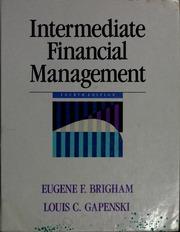Question
Problem 12-5 The Blazingame Corporation is considering a three-year project that has an initial cash outlay (C 0 ) of $175,000 and three cash inflows
Problem 12-5
The Blazingame Corporation is considering a three-year project that has an initial cash outlay (C0) of $175,000 and three cash inflows that are defined by the following independent probability distributions. All dollar figures are in thousands. Blazingame's cost of capital is 11%.
| C1 | C2 | C3 | Probability |
| $50 | $40 | $75 | .25 |
| 60 | 80 | 80 | .50 |
| 70 | 120 | 85 | .25 |
Estimate the project's most likely NPV by using a point estimate of each cash flow. Do not round intermediate calculations. Round the answer to the nearest whole dollar. Enter your answer in dollars and not in thousands of dollars. For example, an answer of $1 thousand should be entered as 1,000 not 1. $ What is the probability of the project's most likely NPV? Do not round intermediate calculations. Round the answer to the six decimal places.
What is the best possible NPV? Do not round intermediate calculations. Round the answer to the nearest whole dollar. Use a minus sign to indicate a negative NPV. Enter your answer in dollars and not in thousands of dollars. For example, an answer of $1 thousand should be entered as 1,000 not 1. $ What is the worst possible NPV? Do not round intermediate calculations. Round the answer to the nearest whole dollar. Use a minus sign to indicate a negative NPV. Enter your answer in dollars and not in thousands of dollars. For example, an answer of $1 thousand should be entered as 1,000 not 1. $ What is the probability of best possible NPV? Do not round intermediate calculations. Round the answer to the six decimal places. What is the probability of worst possible NPV? Do not round intermediate calculations. Round the answer to the six decimal places.
Choose a few outcomes at random, calculate their NPVs and the associated probabilities, and sketch the probability distribution of the project's NPV.
[Hint: The project has 27 possible cash flow patterns (3 3 3), each of which is obtained by selecting one cash flow from each column and combining with the initial outlay. The probability of any pattern is the product of the probabilities of its three uncertain cash flows. For example, a particular pattern might be as follows:
| C0 | C1 | C2 | C3 | |
| Ci | -$175 | $50 | $120 | $80 |
| Probability | 1.0 | .25 | .25 | .50 |
The probability of this pattern would be [0.25 0.25 0.50 0.03125]
Problem 12-4
Keener Clothiers Inc. is considering investing $2 million in an automatic sewing machine to produce a newly designed line of dresses. The dresses will be priced at $200, and management expects to sell 12,000 per year for six years. There is, however, some uncertainty about production costs associated with the new machine. The production department has estimated operating costs at 70% of revenues, but senior management realizes that this figure could turn out to be as low as 65% or as high as 75%. The new machine will be depreciated at a rate of $200,000 per year (straight line, zero salvage). Keener's cost of capital is 13%, and its marginal tax rate is 39%. Assume that Keener Clothiers assigns the following probabilities to production cost as a percent of revenue.
| % of Revenue | Probability |
| 65% | .30 |
| 70% | .50 |
| 75% | .20 |
Sketch a probability distribution (histogram) for the project's NPV.
.
Compute its expected NPV. Round the answer to two decimal places. Enter your answer in dollars. For example, an answer of $1.2 million should be entered as 1,200,000, not 1.2.
Step by Step Solution
There are 3 Steps involved in it
Step: 1

Get Instant Access to Expert-Tailored Solutions
See step-by-step solutions with expert insights and AI powered tools for academic success
Step: 2

Step: 3

Ace Your Homework with AI
Get the answers you need in no time with our AI-driven, step-by-step assistance
Get Started


